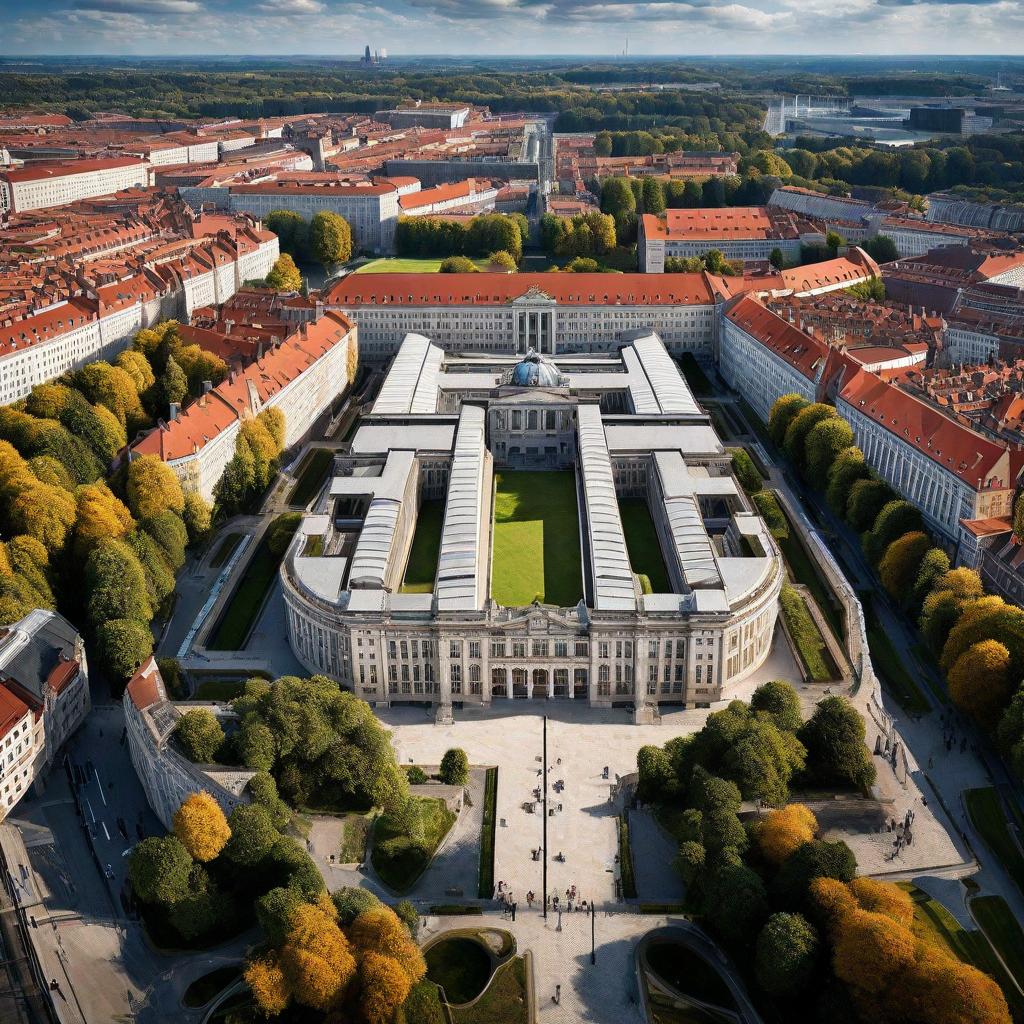Introduction : Top best university in Germany
Germany is home to several world-class universities, but the Technical University of Munich (TUM) stands out as one of the country’s foremost institutions of higher learning. Renowned for its cutting-edge research, innovative teaching methods, and strong emphasis on practical application, TUM consistently ranks among the top universities globally.
With a diverse range of programs spanning engineering, natural sciences, technology, and beyond, TUM attracts top talent from around the world and fosters a dynamic academic community dedicated to addressing global challenges and driving innovation forward.
Technical University of Munich (TUM)

The Technical University of Munich (TUM)
The higher education, certain institutions stand out not just for their prestige, but for their unwavering commitment to innovation, research, and academic excellence. One such beacon of intellectual prowess is the Technical University of Munich (TUM). Renowned globally for its cutting-edge research, state-of-the-art facilities, and a legacy of producing leaders in various fields, TUM has carved a niche for itself as a trailblazer in academia. Let’s embark on a journey to unravel the essence of TUM and understand why it shines brightly in the constellation of world-class universities.
A Brief History
Founded in 1868, TUM has a rich history steeped in tradition and academic heritage. Initially known as the Polytechnic School, it evolved over the decades, adapting to the changing landscape of education and emerging as a powerhouse of knowledge. With roots deeply embedded in Germany’s industrial revolution, TUM has continually reinvented itself to stay at the forefront of technological advancement.
Academic Excellence
At the heart of TUM’s ethos lies a relentless pursuit of academic excellence. Boasting a diverse range of undergraduate, graduate, and doctoral programs, the university offers students a plethora of opportunities to explore their passions and nurture their intellect. From engineering and natural sciences to medicine, economics, and beyond, TUM’s curriculum is designed to foster critical thinking, creativity, and problem-solving skills essential for success in the modern world.
Cutting-Edge Research
TUM stands as a beacon of innovation, driving transformative research that addresses the most pressing challenges facing society today. With a vast network of research institutes, interdisciplinary centers, and collaborative partnerships with industry leaders, TUM is at the forefront of groundbreaking discoveries and technological advancements. Whether it’s pioneering work in renewable energy, artificial intelligence, or biotechnology, TUM’s research endeavors have a profound impact on shaping the future of humanity.
Global Impact
With a commitment to fostering international cooperation and exchange, TUM cultivates a vibrant and diverse community of scholars, researchers, and students from around the globe. Through various exchange programs, joint research initiatives, and strategic partnerships with leading institutions worldwide, TUM extends its reach far beyond its campus borders, contributing to a more interconnected and knowledge-driven world.
State-of-the-Art Facilities
TUM’s commitment to excellence is reflected in its state-of-the-art facilities, equipped with the latest technology and resources to support cutting-edge research and academic endeavors. From advanced laboratories and research centers to modern lecture halls and collaborative workspaces, TUM provides a conducive environment for learning, discovery, and innovation.
Student Experience
Beyond academic pursuits, TUM offers a vibrant and enriching student experience, fostering a sense of community, camaraderie, and personal growth. With a myriad of extracurricular activities, student clubs, and cultural events, TUM ensures that students have ample opportunities to engage, explore, and forge lifelong connections.
In conclusion, the Technical University of Munich (TUM) stands as a beacon of academic excellence, innovation, and global impact. With a rich history, a commitment to cutting-edge research, and a vibrant community of scholars and students, TUM continues to push the boundaries of knowledge and shape the future of education. As we navigate an increasingly complex and interconnected world, TUM remains steadfast in its mission to unlock the full potential of the human intellect and drive positive change for generations to come.
Ludwig Maximilian University of Munich (LMU Munich)

A. Detailed exploration of LMU Munich’s academic excellence and research prowess:
Ludwig Maximilian University of Munich (LMU Munich) is one of Germany’s oldest and most prestigious universities, consistently ranked among the top universities globally. It has a rich history dating back to its foundation in 1472 by Duke Ludwig IX of Bavaria-Landshut. LMU Munich is renowned for its academic excellence and research prowess across various disciplines.
Research Excellence: LMU Munich is a leading research university with a strong emphasis on interdisciplinary collaboration. Its researchers are engaged in cutting-edge projects spanning natural sciences, humanities, social sciences, medicine, and law. The university has numerous research centers and institutes, fostering innovation and groundbreaking discoveries.
Global Rankings: LMU Munich consistently ranks high in global university rankings. It is often listed among the top 50 universities worldwide in various rankings such as the QS World University Rankings, Times Higher Education World University Rankings, and Academic Ranking of World Universities (ARWU).
Nobel Laureates and Awards: LMU Munich boasts an impressive roster of Nobel laureates among its faculty and alumni, reflecting its contribution to significant advancements in various fields. The university has produced Nobel laureates in physics, chemistry, medicine, and literature.
Interdisciplinary Approach: LMU Munich encourages interdisciplinary research and education, fostering collaboration across departments and faculties. This approach facilitates holistic solutions to complex global challenges and promotes innovation.
International Collaborations: LMU Munich has established partnerships with leading universities, research institutions, and industry players worldwide. These collaborations enhance the university’s global reach and facilitate knowledge exchange and research collaborations.
B. Description of programs and departments offered:
LMU Munich offers a diverse range of undergraduate, graduate, and doctoral programs across multiple disciplines. Some of the key departments and programs include:
Faculty of Medicine: Offers programs in medicine, dentistry, and medical research, providing comprehensive training in healthcare and biomedical sciences.
Faculty of Law: Provides programs in law and legal studies, offering both undergraduate and graduate degrees in various legal disciplines.
Faculty of Humanities: Encompasses programs in languages, literature, philosophy, history, and cultural studies, fostering critical thinking and cultural appreciation.
Faculty of Sciences: Offers programs in natural sciences such as biology, chemistry, physics, mathematics, and computer science, emphasizing research-led teaching and practical learning.
Faculty of Economics and Social Sciences: Provides programs in economics, business administration, sociology, political science, and psychology, preparing students for careers in academia, industry, and government.
Faculty of Psychology and Educational Sciences: Offers programs in psychology, education, and related fields, focusing on understanding human behavior and cognitive processes.
C. Notable achievements and contributions to society:
Medical Breakthroughs: LMU Munich researchers have made significant contributions to medical research, including advancements in cancer treatment, neurology, immunology, and regenerative medicine.
Cultural and Literary Contributions: The university’s faculty and alumni have made notable contributions to literature, philosophy, and the arts, enriching global cultural discourse and intellectual heritage.
Environmental and Sustainability Initiatives: LMU Munich is actively engaged in research and initiatives aimed at addressing environmental challenges and promoting sustainability, contributing to global efforts for a more sustainable future.
Social and Political Impact: LMU Munich scholars contribute to societal debates and policy discussions on various issues, including democracy, human rights, social justice, and global governance.
Technological Innovation: The university’s research in technology and engineering has led to innovations in fields such as renewable energy, information technology, robotics, and materials science, driving economic growth and technological advancement.
Heidelberg University

Description of Heidelberg University’s rich history and tradition:
Heidelberg University, located in Heidelberg, Germany, is one of the oldest and most renowned universities in Europe. Its history dates back to 1386 when it was founded by Elector Ruprecht I of the Palatinate. Heidelberg University has a rich tradition of academic excellence, intellectual inquiry, and cultural significance.
Historical Significance: Heidelberg University played a pivotal role in the development of academia and intellectual thought during the Renaissance and Reformation periods. It was a center for theological debate and scientific inquiry, attracting scholars and students from across Europe.
Architectural Splendor: The university is situated in a picturesque setting overlooking the Neckar River and features stunning architectural landmarks such as the Old University Hall, the Heidelberg Castle, and the Student Prison. These historic buildings serve as symbols of the university’s heritage and cultural legacy.
Cultural Hub: Heidelberg University has long been a cultural hub, fostering creativity, innovation, and artistic expression. It has inspired numerous poets, writers, and artists who have immortalized the university and the city of Heidelberg in their works.
Academic Traditions: The university upholds academic traditions such as the Heidelberg Catechism, a seminal Protestant theological document, and the Heidelberg Disputation, a historic debate between Martin Luther and theologians of the Catholic Church.
Continued Relevance: Despite its long history, Heidelberg University remains at the forefront of higher education and research, continually adapting to the changing needs of society while preserving its cherished traditions and values.
B. Focus on interdisciplinary research and international partnerships:
Heidelberg University is renowned for its commitment to interdisciplinary research and international collaboration, fostering innovation and addressing complex global challenges.
Interdisciplinary Approach: The university promotes interdisciplinary research initiatives that transcend traditional academic boundaries, encouraging collaboration across departments, faculties, and research centers. This approach facilitates comprehensive solutions to multifaceted problems in areas such as health, energy, climate change, and technology.
Research Centers and Institutes: Heidelberg University hosts numerous research centers and institutes specializing in diverse fields such as neuroscience, environmental science, molecular biology, and cultural studies. These centers serve as hubs for interdisciplinary collaboration, attracting scholars and researchers from around the world.
International Partnerships: Heidelberg University has established strategic partnerships with leading universities, research institutions, and industry partners worldwide. These collaborations promote knowledge exchange, joint research projects, and student mobility, enriching the academic experience and fostering global understanding and cooperation.
Global Engagement: The university actively engages with global challenges and opportunities through international research networks, joint degree programs, and cross-cultural initiatives. It cultivates a diverse and inclusive academic community that values different perspectives and fosters mutual respect and understanding.
C. Notable alumni and their contributions to various fields:
Heidelberg University has produced numerous notable alumni who have made significant contributions to various fields, including science, literature, politics, and philosophy. Some notable alumni include:
Max Weber: Renowned sociologist and philosopher known for his work on rationalization, bureaucracy, and the Protestant work ethic.
Karl Jaspers: Influential existentialist philosopher and psychiatrist who made significant contributions to the understanding of human existence and freedom.
Hans Geiger: Physicist who co-invented the Geiger counter, a device used for detecting and measuring ionizing radiation, revolutionizing nuclear physics and radiation detection.
Emmy Noether: Mathematician known for her groundbreaking contributions to abstract algebra and theoretical physics, particularly Noether’s theorem, which relates symmetries and conservation laws.
Thomas Mann: Nobel Prize-winning author known for his novels such as “Buddenbrooks” and “The Magic Mountain,” which explore themes of identity, morality, and the human condition.
Freie Universität Berlin (Freie University of Berlin)

A. Overview of FU Berlin’s commitment to academic freedom and diversity:
Freie Universität Berlin (FU Berlin) is renowned for its steadfast commitment to academic freedom, diversity, and democratic values, which are deeply ingrained in its institutional ethos and guiding principles.
Academic Freedom: FU Berlin upholds the principles of academic freedom, providing a space for open inquiry, free expression, and intellectual exchange. Faculty and students are encouraged to pursue research and scholarship without fear of censorship or ideological constraints.
Diversity and Inclusion: The university is dedicated to fostering a diverse and inclusive academic community that values the contributions of individuals from different backgrounds, cultures, and perspectives. It actively promotes diversity in its student body, faculty recruitment, and curriculum development.
Democratic Governance: FU Berlin operates on principles of democratic governance, involving faculty, students, and staff in decision-making processes and fostering a culture of transparency and accountability.
Protection of Human Rights: The university is committed to upholding human rights and promoting social justice both within its academic community and in society at large. It champions initiatives and programs aimed at combating discrimination, inequality, and injustice.
Engagement with Controversial Issues: FU Berlin encourages critical engagement with controversial issues and debates, providing a platform for dissenting voices and alternative perspectives. It recognizes the importance of intellectual pluralism in advancing knowledge and understanding.
B. Emphasis on research-led teaching and global engagement:
Freie Universität Berlin places a strong emphasis on research-led teaching and global engagement, enriching the academic experience and fostering international collaboration and exchange.
Research Excellence: The university is home to world-class research institutes and centers, covering a wide range of disciplines from natural sciences and humanities to social sciences and law. Faculty members are actively engaged in cutting-edge research projects that address pressing societal challenges and contribute to the advancement of knowledge.
Integration of Research and Teaching: FU Berlin integrates research into its teaching curriculum, providing students with opportunities to engage in hands-on research experiences, independent study projects, and collaborative research with faculty mentors.
Global Partnerships: The university has established strategic partnerships with leading academic institutions, research organizations, and industry partners around the world. These partnerships facilitate joint research initiatives, student exchange programs, and collaborative academic endeavors that transcend geographical boundaries.
Internationalization Initiatives: FU Berlin is committed to promoting internationalization across its campus, welcoming students, scholars, and researchers from diverse cultural and linguistic backgrounds. It offers a wide range of international programs, courses taught in English, and support services for international students and scholars.
Cultural Exchange and Collaboration: The university promotes cultural exchange and collaboration through various initiatives such as international conferences, guest lectures, cultural events, and exchange programs. These activities enrich the academic and cultural life of the campus community and contribute to mutual understanding and cooperation.
C. Impact on social sciences, humanities, and cultural studies:
Freie Universität Berlin has made significant contributions to the fields of social sciences, humanities, and cultural studies through its pioneering research, innovative teaching methods, and interdisciplinary collaborations.
Interdisciplinary Research Centers: The university hosts interdisciplinary research centers and institutes that focus on pressing societal issues such as migration, globalization, democracy, and sustainability. These centers bring together scholars from diverse disciplines to conduct collaborative research and generate interdisciplinary insights.
Critical Theory and Cultural Studies: FU Berlin is renowned for its contributions to critical theory and cultural studies, with faculty members making significant contributions to fields such as literary criticism, media studies, film studies, and cultural anthropology. The university’s interdisciplinary approach encourages critical thinking and theoretical innovation.
Historical Research and Memory Studies: The university’s faculty members in history, political science, and sociology have conducted groundbreaking research in memory studies, exploring issues related to collective memory, historical trauma, and the construction of national identity. Their work sheds light on the complexities of historical narratives and their impact on contemporary society.
Social and Political Impact: FU Berlin’s research in social sciences and humanities has had a significant impact on public policy, social movements, and civil society. Faculty members engage in public debates, policy discussions, and community outreach activities, contributing to informed decision-making and social change.
Cross-Cultural Dialogue: The university promotes cross-cultural dialogue and understanding through its research collaborations, international partnerships, and cultural exchange programs. Faculty members and students engage with diverse perspectives, languages, and cultural traditions, enriching their academic experience and fostering intercultural competence.
Conclusion
A. Recap of top universities in Germany and their significance:
Germany is home to several prestigious universities that are globally recognized for their academic excellence, research prowess, and contributions to society. Among these, some of the top universities include:
Technical University of Munich (TUM): Known for its strength in engineering, natural sciences, and technology, TUM is a hub for innovation and entrepreneurship, driving technological advancements and economic growth.
Heidelberg University: With a rich history dating back to the 14th century, Heidelberg University is renowned for its commitment to academic freedom, interdisciplinary research, and cultural heritage, shaping intellectual discourse and cultural exchange.
Ludwig Maximilian University of Munich (LMU Munich): A leading research university with strengths across various disciplines, LMU Munich excels in both natural sciences and humanities, producing Nobel laureates and fostering global collaborations.
Freie Universität Berlin (Free University of Berlin): Known for its dedication to academic freedom, diversity, and international engagement, FU Berlin is a hub for interdisciplinary research and critical inquiry, shaping debates on social sciences, humanities, and cultural studies.
These universities play a significant role in advancing knowledge, driving innovation, and fostering global cooperation, contributing to Germany’s reputation as a hub for higher education and research excellence.
B. Reflection on the role of education in shaping society and fostering innovation:
Education plays a pivotal role in shaping society and fostering innovation by equipping individuals with the knowledge, skills, and values needed to thrive in an increasingly complex and interconnected world. German universities, with their emphasis on academic freedom, research-led teaching, and interdisciplinary collaboration, serve as catalysts for societal progress and technological innovation.
Through education, individuals gain critical thinking abilities, problem-solving skills, and a sense of civic responsibility, enabling them to address pressing challenges such as climate change, inequality, and global health crises. Moreover, universities serve as engines of innovation, where groundbreaking research leads to scientific discoveries, technological advancements, and new solutions to societal problems.
Furthermore, education fosters cultural understanding, social cohesion, and respect for diversity, laying the foundation for a more inclusive and sustainable society. By investing in education, societies can unlock human potential, drive economic growth, and build resilient communities capable of confronting the challenges of the 21st century.
C. Encouragement for further exploration and engagement with top German universities:
As we reflect on the significance of education and the role of top German universities in shaping society and fostering innovation, I encourage continued exploration and engagement with these institutions. Whether through academic pursuits, research collaborations, or cultural exchange programs, there are numerous opportunities to connect with Germany’s vibrant academic community and contribute to its ongoing legacy of excellence.
By actively engaging with top German universities, individuals can broaden their horizons, expand their knowledge, and make meaningful contributions to addressing global challenges. Let us embrace the spirit of curiosity, collaboration, and lifelong learning as we journey towards a brighter and more inclusive future together.
ALSO READ : 5 Best University in United Kingdom
FAQs :
What are the top universities in Germany?
- The top universities in Germany include Technical University of Munich (TUM), Heidelberg University, Ludwig Maximilian University of Munich (LMU Munich), and Freie Universität Berlin (Free University of Berlin), among others.
What makes German universities stand out internationally?
- German universities are known for their strong emphasis on research, academic excellence, and practical relevance. They offer a wide range of programs in various disciplines, often taught in English, attracting students and scholars from around the world.
How can international students apply to study at German universities?
- International students can apply directly to their chosen universities or through centralized application platforms such as uni-assist. They typically need to submit academic transcripts, language proficiency test scores (such as TOEFL or IELTS), letters of recommendation, and a statement of purpose.
Are there scholarships available for international students to study in Germany?
- Yes, there are various scholarships available for international students to study in Germany, including those offered by the German Academic Exchange Service (DAAD), government-funded scholarships, and scholarships from individual universities and organizations.
What are the tuition fees like at German universities for international students?
- Many public universities in Germany do not charge tuition fees, even for international students, except for nominal administrative fees. However, there may be tuition fees for certain specialized programs or for studying at private universities.
What are the popular fields of study at German universities?
- Germany is known for its strong STEM (science, technology, engineering, and mathematics) programs, particularly in engineering, computer science, and natural sciences. However, there are also excellent programs in social sciences, humanities, business, and the arts.
Do German universities offer programs in English?
- Yes, many German universities offer programs taught entirely in English, particularly at the graduate level. This allows international students to study in Germany without needing to be fluent in German, although learning the language is still beneficial for daily life and integration.
How is student life at German universities?
- Student life at German universities is vibrant and diverse, with numerous clubs, societies, and activities catering to various interests. Many universities have active student unions that organize events, sports activities, and cultural outings, fostering a sense of community and belonging.
What are the career prospects like for international students who graduate from German universities?
- Graduates from German universities enjoy excellent career prospects, both within Germany and internationally. The country’s strong economy and emphasis on innovation make it an attractive destination for skilled professionals in various fields.
Are there opportunities for international students to work or intern while studying in Germany?
- Yes, international students in Germany are allowed to work part-time (usually up to 20 hours per week) during the semester and full-time during semester breaks. Many universities also offer internship programs and career services to help students gain practical experience and connect with potential employers.


